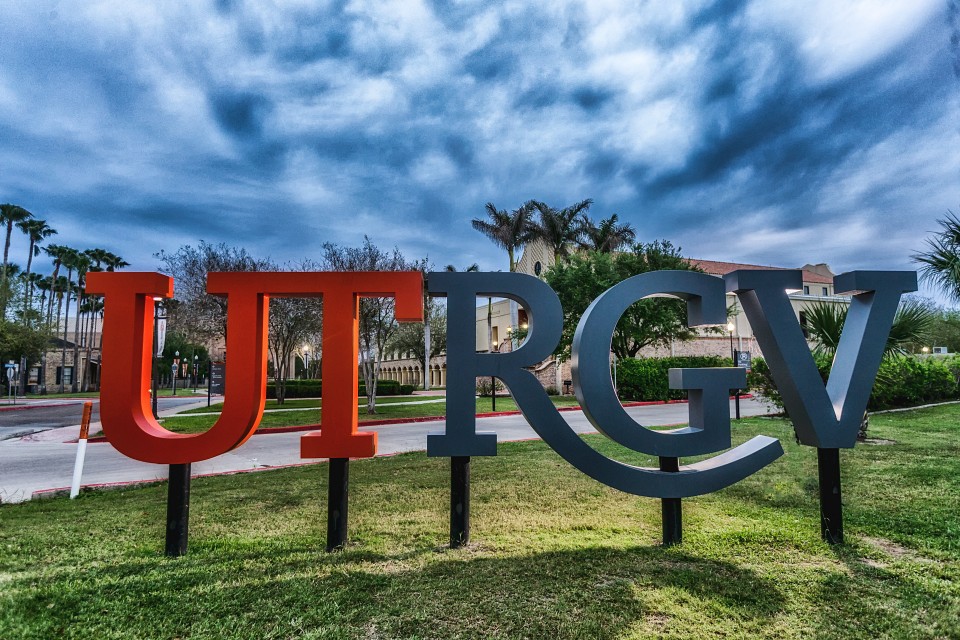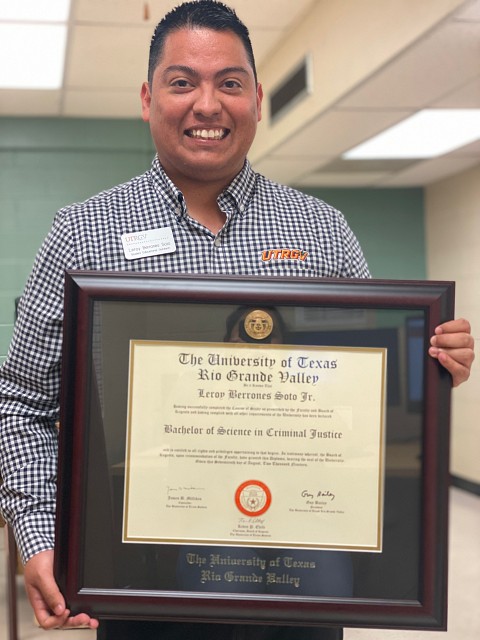
(UTRGV Archival Photo by David Pike)
News Release | Community

(UTRGV Archival Photo by David Pike)
Wednesday, July 8, 2020
Community, Around Campus
By Amanda Alaniz
RIO GRANDE VALLEY, TEXAS – JULY 8, 2020 – Former foster youths – individuals who have spent time in the foster care system – are reported to face significant barriers to achieving academic and personal success.
About less than 3 percent of those who aged out of the foster care system earned a four-year college degree, compared to 36 percent of youths in the general population. And in Texas, only 1.5 percent of the foster care alumni earn a bachelor’s degree or higher.
Leroy Berrones Soto – a former foster youth, UTRGV alum, and now a graduate student working with the GEAR UP College in ACTion! under UTRGV Office of Student Educational Outreach – is working to help change those statistics.
“I like seeing success, it makes me happy,” he said. “We won’t be 3 percent anymore, we’ll be 90, 99, 100 percent before we know it. The number of our foster youth at the university has increased from when I started. I think it was about 12 of us back then. And now, what I got from the Texas Higher Education Coordinating Board, is that we have about 30 to 40 students.”

MAKING LIFE CHANGES
Berrones Soto, an Edinburg resident, currently works as the student project associate with GEAR UP and helps former foster students at UTRGV, finding ways to collaborate with the community to locate resources and available opportunities for foster care youth.
As a former foster youth himself, Berrones Soto recognizes the importance of having a support system to make transitions in life, like college.
He was in and out of the foster care system for about five years and was placed in several different homes. He even spent some time in a shelter. It wasn’t until much later, when he found some stability, that talk about college became possible.
He began attending UTPA in 2013 to earn a bachelor’s degree in criminal justice, with the support of his foster parents and the child-placing agency. He admits he doubted he would be able to get to college, but that changed when he attended a foster care conference hosted by the university.
“In that conference, we had speakers who were former foster youth. Attending helped me meet the then UTPA vice president and the former foster care liaison,” he said. “When I wanted to apply, they were the ones I reached out to for help.”
Once his college career was underway, he got involved in foster care alumni representation and resources at the university. He also connected with other students who were in foster care. Access to those sorts of things is fundamental for success, he said.
“I think that somebody being there and helping former foster youth with housing, so they won’t be homeless, is so important. I was lucky to get the university to help me pay my dorm, food during the break, and connecting me to campus resources,” he said. “I think they’re very important in making sure we continue to succeed and make our dreams come true.”
Now, he is helping foster care alumni who currently are where he was, and he is determined to make a difference.
HELP DURING THE PANDEMIC
Much changed rapidly at UTRGV as the university adapted and continues to adapt to the COVID-19 pandemic, especially with classes going online. So Berrones Soto reached out to students from foster care to see what they needed most. The top responses were for laptops and food.
He contacted two organizations – Foster Angels of South Texas, and One Simple Wish – to help fulfill the need for laptops for several students. He also was able to contact a non-profit in Austin, which mailed the students grocery store gift cards.
The feedback was overwhelmingly positive, and he got messages and letters from the students thanking him for his help.
“I think reaching out to them, and them knowing someone is there looking out for them – I mean, this is traumatic for all of us,” he said. “I’m lucky I have a big support system that’s able to help me. But a lot of students don’t have that opportunity, that person who will look to see what their needs are. I’m grateful I was able to help them.”
All public institutions do have foster care liaisons dedicated to helping former foster youth through their college career with resources. UTRGV has two under the Fostering Success office, which is dedicated to helping former foster care students pursue their academic and professional goals.
BIG PLANS FOR THE FUTURE
Berrones Soto is back in school, working on a master’s degree in public affairs via UTRGV’s accelerated program. It has been challenging, he said, but he has been enjoying it because he knows it will lead him on a path to helping people.
His next step is to work toward law school. He already has some experience working with lawyers and learned about the child protection court. His goal is to become a child welfare attorney with the child protection court.
For now, the UTRGV alum will continue his work at the university and encourages other foster care alumni to seek help, ask questions and utilize all resources available to them.
He also said finding a support system can help them navigate successfully through college.
His hope is that his story will inspire other foster care alumni who are in college or who are thinking about enrolling. He encourages them to never give up, and to find their path to success. His mentors instilled in him that they, in turn, can help others like them.
“I always remember to pay it forward,” Berrones Soto said. “Sometimes, when I see someone who needs help with food, I give them some money to buy food. It may not be a lot, but anything for someone who needs help means a lot.
“At the end of the day, I know we’re helping someone succeed.”
ABOUT UTRGV
The University of Texas Rio Grande Valley (UTRGV) was created by the Texas Legislature in 2013 as the first major public university of the 21st century in Texas. This transformative initiative provided the opportunity to expand educational opportunities in the Rio Grande Valley, including a new School of Medicine and a School of Podiatry, and made it possible for residents of the region to benefit from the Permanent University Fund – a public endowment contributing support to the University of Texas System and other institutions.
UTRGV has campuses and off-campus research and teaching sites throughout the Rio Grande Valley including Brownsville (formerly The University of Texas at Brownsville campus), Edinburg (formerly The University of Texas-Pan American campus), Harlingen, Weslaco, McAllen, Port Isabel, Rio Grande City and South Padre Island. UTRGV, a comprehensive academic institution, enrolled its first class in the fall of 2015; the School of Medicine welcomed its first class in the summer of 2016, and the School of Podiatric Medicine in the fall of 2022.